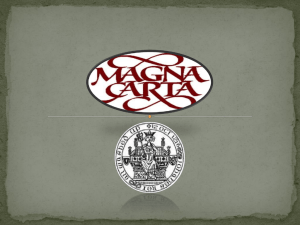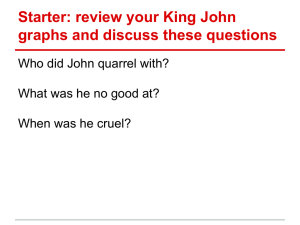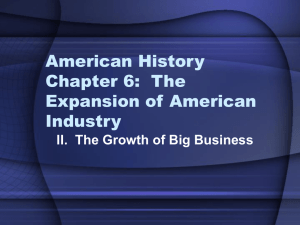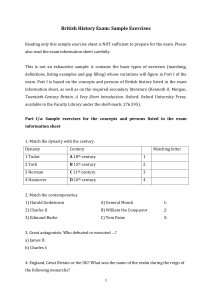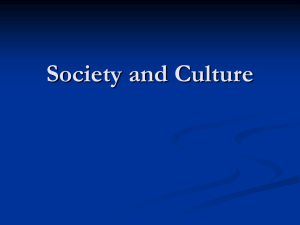Magna Carta - National Liberty Alliance
advertisement
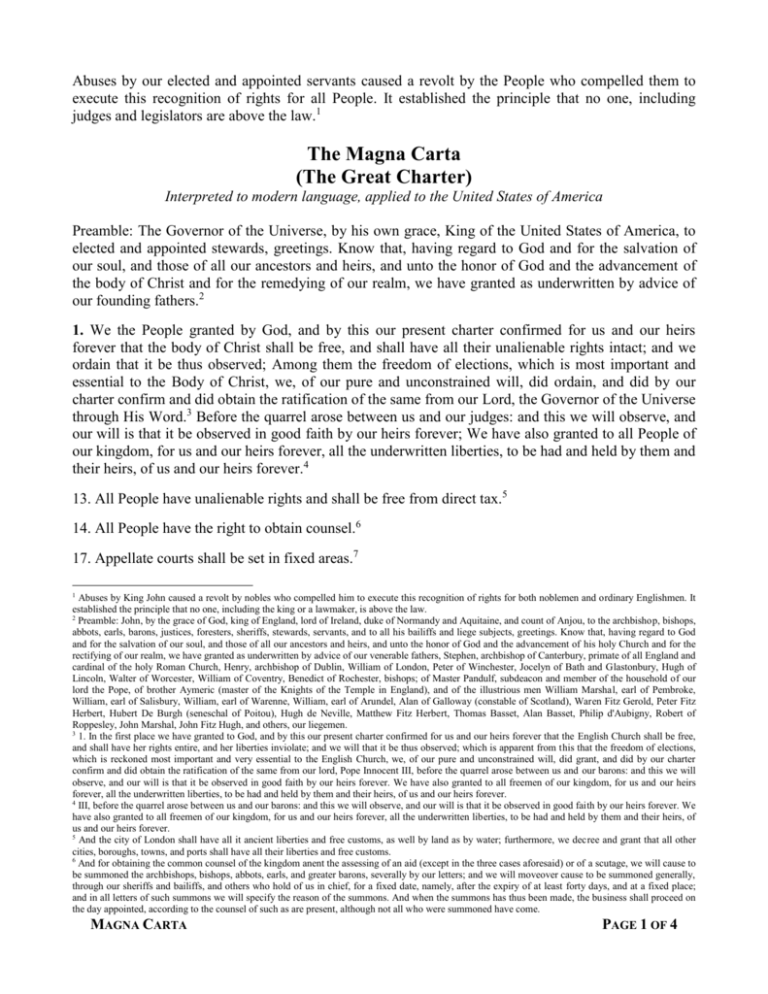
Abuses by our elected and appointed servants caused a revolt by the People who compelled them to execute this recognition of rights for all People. It established the principle that no one, including judges and legislators are above the law.1 The Magna Carta (The Great Charter) Interpreted to modern language, applied to the United States of America Preamble: The Governor of the Universe, by his own grace, King of the United States of America, to elected and appointed stewards, greetings. Know that, having regard to God and for the salvation of our soul, and those of all our ancestors and heirs, and unto the honor of God and the advancement of the body of Christ and for the remedying of our realm, we have granted as underwritten by advice of our founding fathers.2 1. We the People granted by God, and by this our present charter confirmed for us and our heirs forever that the body of Christ shall be free, and shall have all their unalienable rights intact; and we ordain that it be thus observed; Among them the freedom of elections, which is most important and essential to the Body of Christ, we, of our pure and unconstrained will, did ordain, and did by our charter confirm and did obtain the ratification of the same from our Lord, the Governor of the Universe through His Word.3 Before the quarrel arose between us and our judges: and this we will observe, and our will is that it be observed in good faith by our heirs forever; We have also granted to all People of our kingdom, for us and our heirs forever, all the underwritten liberties, to be had and held by them and their heirs, of us and our heirs forever.4 13. All People have unalienable rights and shall be free from direct tax.5 14. All People have the right to obtain counsel.6 17. Appellate courts shall be set in fixed areas.7 1 Abuses by King John caused a revolt by nobles who compelled him to execute this recognition of rights for both noblemen and ordinary Englishmen. It established the principle that no one, including the king or a lawmaker, is above the law. 2 Preamble: John, by the grace of God, king of England, lord of Ireland, duke of Normandy and Aquitaine, and count of Anjou, to the archbishop, bishops, abbots, earls, barons, justices, foresters, sheriffs, stewards, servants, and to all his bailiffs and liege subjects, greetings. Know that, having regard to God and for the salvation of our soul, and those of all our ancestors and heirs, and unto the honor of God and the advancement of his holy Church and for the rectifying of our realm, we have granted as underwritten by advice of our venerable fathers, Stephen, archbishop of Canterbury, primate of all England and cardinal of the holy Roman Church, Henry, archbishop of Dublin, William of London, Peter of Winchester, Jocelyn of Bath and Glastonbury, Hugh of Lincoln, Walter of Worcester, William of Coventry, Benedict of Rochester, bishops; of Master Pandulf, subdeacon and member of the household of our lord the Pope, of brother Aymeric (master of the Knights of the Temple in England), and of the illustrious men William Marshal, earl of Pembroke, William, earl of Salisbury, William, earl of Warenne, William, earl of Arundel, Alan of Galloway (constable of Scotland), Waren Fitz Gerold, Peter Fitz Herbert, Hubert De Burgh (seneschal of Poitou), Hugh de Neville, Matthew Fitz Herbert, Thomas Basset, Alan Basset, Philip d'Aubigny, Robert of Roppesley, John Marshal, John Fitz Hugh, and others, our liegemen. 3 1. In the first place we have granted to God, and by this our present charter confirmed for us and our heirs forever that the English Church shall be free, and shall have her rights entire, and her liberties inviolate; and we will that it be thus observed; which is apparent from this that the freedom of elections, which is reckoned most important and very essential to the English Church, we, of our pure and unconstrained will, did grant, and did by our charter confirm and did obtain the ratification of the same from our lord, Pope Innocent III, before the quarrel arose between us and our barons: and this we will observe, and our will is that it be observed in good faith by our heirs forever. We have also granted to all freemen of our kingdom, for us and our heirs forever, all the underwritten liberties, to be had and held by them and their heirs, of us and our heirs forever. 4 III, before the quarrel arose between us and our barons: and this we will observe, and our will is that it be observed in good faith by our heirs forever. We have also granted to all freemen of our kingdom, for us and our heirs forever, all the underwritten liberties, to be had and held by them and their heirs, of us and our heirs forever. 5 And the city of London shall have all it ancient liberties and free customs, as well by land as by water; furthermore, we decree and grant that all other cities, boroughs, towns, and ports shall have all their liberties and free customs. 6 And for obtaining the common counsel of the kingdom anent the assessing of an aid (except in the three cases aforesaid) or of a scutage, we will cause to be summoned the archbishops, bishops, abbots, earls, and greater barons, severally by our letters; and we will moveover cause to be summoned generally, through our sheriffs and bailiffs, and others who hold of us in chief, for a fixed date, namely, after the expiry of at least forty days, and at a fixed place; and in all letters of such summons we will specify the reason of the summons. And when the summons has thus been made, the business shall proceed on the day appointed, according to the counsel of such as are present, although not all who were summoned have come. MAGNA CARTA PAGE 1 OF 4 18. County court jurisdictions shall be set with circuit judges.8 19. All judicial business shall be attended to before circuit judges move to the next county.9 26. If anyone dies in debt his property will be seized until debts are settled and the remainder be given to his wife and children.10 27. If anyone dies without a will his property shall be distributed to his nearest kinsfolk under supervision of the Church.11 28. Personal property rights.12 29. Performance of duty required.13 30. No sheriff shall take the horses or carts for transport duty without permission.14 31. Land property rights.15 33. Right of waterway (rivers and streams) shall not be obstructed.16 34. The writ which is called praecipe (summary judgment) shall not be issued whereby a freeman may lose his court.17 35. Trade shall be made regular throughout the land.18 38. Warrants requires sworn affidavit of a creditable witness.19 39. Right of due process.20 40. Free court access, NO FEES.21 41. Trade shall be made regular between nations.22 7 Common pleas shall not follow our court, but shall be held in some fixed place. Inquests of novel disseisin, of mort d'ancestor, and of darrein presentment shall not be held elsewhere than in their own county courts, and that in manner following; We, or, if we should be out of the realm, our chief justiciar, will send two justiciaries through every county four times a year, who shall alone with four knights of the county chosen by the county, hold the said assizes in the county court, on the day and in the place of meeting of that court. 9 And if any of the said assizes cannot be taken on the day of the county court, let there remain of the knights and freeholders, who were present at the county court on that day, as many as may be required for the efficient making of judgments, according as the business be more or less. 10 If anyone holding of us a lay fief shall die, and our sheriff or bailiff shall exhibit our letters patent of summons for a debt which the deceased owed us, it shall be lawful for our sheriff or bailiff to attach and enroll the chattels of the deceased, found upon the lay fief, to the value of that debt, at the sight of law worthy men, provided always that nothing whatever be thence removed until the debt which is evident shall be fully paid to us; and the residue shall be left to the executors to fulfill the will of the deceased; and if there be nothing due from him to us, all the chattels shall go to the deceased, saving to his wife and children their reasonable shares. 11 If any freeman shall die intestate, his chattels shall be distributed by the hands of his nearest kinsfolk and friends, under supervision of the Church, saving to every one the debts which the deceased owed to him. 12 No constable or other bailiff of ours shall take corn or other provisions from anyone without immediately tendering money therefor, unless he can have postponement thereof by permission of the seller. 13 No constable shall compel any knight to give money in lieu of castle-guard, when he is willing to perform it in his own person, or (if he himself cannot do it from any reasonable cause) then by another responsible man. Further, if we have led or sent him upon military service, he shall be relieved from guard in proportion to the time during which he has been on service because of us. 14 No sheriff or bailiff of ours, or other person, shall take the horses or carts of any freeman for transport duty, against the will of the said freeman. 15 Neither we nor our bailiffs shall take, for our castles or for any other work of ours, wood which is not ours, against the will of the owner of that wood. 16 All kydells for the future shall be removed altogether from Thames and Medway, and throughout all England, except upon the seashore. 17 The writ which is called praecipe shall not for the future be issued to anyone, regarding any tenement whereby a freeman may lose his court. 18 Let there be one measure of wine throughout our whole realm; and one measure of ale; and one measure of corn, to wit, "the London quarter"; and one width of cloth (whether dyed, or russet, or "halberget"), to wit, two ells within the selvedges; of weights also let it be as of measures. 19 No bailiff for the future shall, upon his own unsupported complaint, put anyone to his "law", without credible witnesses brought for this purposes. 20 No freemen shall be taken or imprisoned or disseised or exiled or in any way destroyed, nor will we go upon him nor send upon him, except by the lawful judgment of his peers or by the law of the land. 21 To no one will we sell, to no one will we refuse or delay, right or justice. 8 MAGNA CARTA PAGE 2 OF 4 42. Right to travel.23 43. If anyone holding property dies without heirs the state will take control.24 44. Court cases shall be heard within the jurisdiction that they arise.25 45. Justices, constables, sheriffs, or bailiffs shall serve only during good behavior.26 48. All evil customs shall be judged by 12 honest men (jury) and be utterly abolished.27 51. No foreign armies shall be on the land.28 52. If anyone has been dispossessed or removed without the legal judgment of his peers, from his lands, castles, franchises, or from his right, we will immediately restore them to him; and if a dispute arise over this, then let it be decided by the twenty-five of whom mention is made below in the clause for securing the peace. Moreover, for all those possessions, from which anyone has, without the lawful judgment of his peers been removed by elected servants we will immediately grant full justice (through trial by jury).29 55. The twenty-five shall secure the peace according to the judgment of the majority.30 56. If anyone is deprived or removed from lands or liberties, or other things, without the legal judgment of their peers the twenty-five (grand jury) shall immediately restored them; and if a dispute arise over this, then let it be decided by the judgment of their peers (trial jury); according to the common law.31 22 All merchants shall have safe and secure exit from England, and entry to England, with the right to tarry there and to move about as well by land as by water, for buying and selling by the ancient and right customs, quit from all evil tolls, except (in time of war) such merchants as are of the land at war with us. And if such are found in our land at the beginning of the war, they shall be detained, without injury to their bodies or goods, until information be received by us, or by our chief justiciar, how the merchants of our land found in the land at war with us are treated; and if our men are safe there, the others shall be safe in our land. 23 It shall be lawful in future for anyone (excepting always those imprisoned or outlawed in accordance with the law of the kingdom, and natives of any country at war with us, and merchants, who shall be treated as if above provided) to leave our kingdom and to return, safe and secure by land and water, except for a short period in time of war, on grounds of public policy- reserving always the allegiance due to us. 24 If anyone holding of some escheat (such as the honor of Wallingford, Nottingham, Boulogne, Lancaster, or of other escheats which are in our hands and are baronies) shall die, his heir shall give no other relief, and perform no other service to us than he would have done to the baron if that barony had been in the baron's hand; and we shall hold it in the same manner in which the baron held it. 25 Men who dwell without the forest need not henceforth come before our justiciaries of the forest upon a general summons, unless they are in plea, or sureties of one or more, who are attached for the forest. 26 We will appoint as justices, constables, sheriffs, or bailiffs only such as know the law of the realm and mean to observe it well. 27 All evil customs connected with forests and warrens, foresters and warreners, sheriffs and their officers, river banks and their wardens, shall immediately by inquired into in each county by twelve sworn knights of the same county chosen by the honest men of the same county, and shall, within forty days of the said inquest, be utterly abolished, so as never to be restored, provided always that we previously have intimation thereof, or our justiciar, if we should not be in England. 28 As soon as peace is restored, we will banish from the kingdom all foreign born knights, crossbowmen, serjeants, and mercenary soldiers who have come with horses and arms to the kingdom's hurt. 29 If anyone has been dispossessed or removed by us, without the legal judgment of his peers, from his lands, castles, franchises, or from his right, we will immediately restore them to him; and if a dispute arise over this, then let it be decided by the five and twenty barons of whom mention is made below in the clause for securing the peace. Moreover, for all those possessions, from which anyone has, without the lawful judgment of his peers, been disseised or removed, by our father, King Henry, or by our brother, King Richard, and which we retain in our hand (or which as possessed by others, to whom we are bound to warrant them) we shall have respite until the usual term of crusaders; excepting those things about which a plea has been raised, or an inquest made by our order, before our taking of the cross; but as soon as we return from the expedition, we will immediately grant full justice therein. 30 All fines made with us unjustly and against the law of the land, and all amercements, imposed unjustly and against the law of the land, shall be entirely remitted, or else it shall be done concerning them according to the decision of the five and twenty barons whom mention is made below in the clause for securing the pease, or according to the judgment of the majority of the same, along with the aforesaid Stephen, archbishop of Canterbury, if he can be present, and such others as he may wish to bring with him for this purpose, and if he cannot be present the business shall nevertheless proceed without him, provided always that if any one or more of the aforesaid five and twenty barons are in a similar suit, they shall be removed as far as concerns this particular judgment, others being substituted in their places after having been selected by the rest of the same five and twenty for this purpose only, and after having been sworn. 31 . If we have disseised or removed Welshmen from lands or liberties, or other things, without the legal judgment of their peers in England or in Wales, they shall be immediately restored to them; and if a dispute arise over this, then let it be decided in the marches by the judgment of their peers; for the MAGNA CARTA PAGE 3 OF 4 57. If anyone is deprived of their possessions without the lawful judgment of his peers we will immediately grant full justice (trial by jury) in accordance with the laws of the land.32 60. All of the aforesaid customs and liberties which we the twenty-five have ordained in our land as far as pertains to us towards the People, shall be observed by all of our elected servants.33 61. Move-over, for God and the amendment of our kingdom and for the better calming of the quarrel that has arisen between us and our elected and appointed stewards, we have ordained all these concessions, desiring that they should enjoy them in complete and firm endurance forever, we give and grant to them the underwritten security, namely, that the twenty-five who shall be bound by oath to observe and hold, and cause to observed peace and liberties we have granted and confirmed to them by this our present Charter, so that if we, or our justices, or our sheriffs or any one of our officers, shall in anything be at fault towards anyone, or shall have broken any one of the articles of this peace or of this security, and the offense be notified to four of the foresaid twenty-five, the said four shall repair to us and, laying the transgression before us, petition to have that transgression redressed without delay.34 63. Wherefore we ordain and firmly order that the Church be free, and that the People have and hold all the aforesaid liberties, rights, and concessions, well and peaceably, freely and quietly, fully and wholly, for themselves and their heirs, of us and our heirs, in all respects and in all places forever, as is aforesaid. An oath, moreover, has been taken, as well on our part as on the art of the elected servants, that all these conditions aforesaid shall be kept in good faith and without evil intent.35 tenements in England according to the law of England, for tenements in Wales according to the law of Wales, and for tenements in the marches according to the law of the marches. Welshmen shall do the same to us and ours 32 Further, for all those possessions from which any Welshman has, without the lawful judgment of his peers, been disseised or removed by King Henry our father, or King Richard our brother, and which we retain in our hand (or which are possessed by others, and which we ought to warrant), we will have respite until the usual term of crusaders; excepting those things about which a plea has been raised or an inquest made by our order before we took the cross; but as soon as we return (or if perchance we desist from our expedition), we will immediately grant full justice in accordance with the laws of the Welsh and in relation to the foresaid regions. 33 Moreover, all these aforesaid customs and liberties, the observances of which we have granted in our kingdom as far as pertains to us towards our men, shall be observed b all of our kingdom, as well clergy as laymen, as far as pertains to them towards their men. 34 Since, move-over, for God and the amendment of our kingdom and for the better allaying of the quarrel that has arisen between us and our barons, we have granted all these concessions, desirous that they should enjoy them in complete and firm endurance forever, we give and grant to them the underwritten security, namely, that the barons choose five and twenty barons of the kingdom, whomsoever they will, who shall be bound with all their might, to observe and hold, and cause to be observed, the peace and liberties we have granted and confirmed to them by this our present Charter, so that if we, or our justiciar, or our bailiffs or any one of our officers, shall in anything be at fault towards anyone, or shall have broken any one of the articles of this peace or of this security, and the offense be notified to four barons of the foresaid five and twenty, the said four barons shall repair to us (or our justiciar, if we are out of the realm) and, laying the transgression before us, petition to have that transgression redressed without delay. And if we shall not have corrected the transgression (or, in the event of our being out of the realm, if our justiciar shall not have corrected it) within forty days, reckoning from the time it has been intimated to us (or to our justiciar, if we should be out of the realm), the four barons aforesaid shall refer that matter to the rest of the five and twenty barons, and those five and twenty barons shall, together with the community of the whole realm, distrain and distress us in all possible ways, namely, by seizing our castles, lands, possessions, and in any other way they can, until redress has been obtained as they deem fit, saving harmless our own person, and the persons of our queen and children; and when redress has been obtained, they shall resume their old relations towards us. And let whoever in the country desires it, swear to obey the orders of the said five and twenty barons for the execution of all the aforesaid matters, and along with them, to molest us to the utmost of his power; and we publicly and freely grant leave to everyone who wishes to swear, and we shall never forbid anyone to swear. All those, moveover, in the land who of themselves and of their own accord are unwilling to swear to the twenty five to help them in constraining and molesting us, we shall by our command compel the same to swear to the effect foresaid. And if any one of the five and twenty barons shall have died or departed from the land, or be incapacitated in any other manner which would prevent the foresaid provisions being carried out, those of the said twenty five barons who are left shall choose another in his place according to their own judgment, and he shall be sworn in the same way as the others. Further, in all matters, the execution of which is entrusted,to these twenty five barons, if perchance these twenty five are present and disagree about anything, or if some of them, after being summoned, are unwilling or unable to be present, that which the majority of those present ordain or command shall be held as fixed and established, exactly as if the whole twenty five had concurred in this; and the said twenty five shall swear that they will faithfully observe all that is aforesaid, and cause it to be observed with all their might. And we shall procure nothing from anyone, directly or indirectly, whereby any part of these concessions and liberties might be revoked or diminished; and if any such things has been procured, let it be void and null, and we shall never use it personally or by another. 35 Wherefore we will and firmly order that the English Church be free, and that the men in our kingdom have and hold all the aforesaid liberties, rights, and concessions, well and peaceably, freely and quietly, fully and wholly, for themselves and their heirs, of us and our heirs, in all respects and in all places forever, as is aforesaid. An oath, moreover, has been taken, as well on our part as on the art of the barons, that all these conditions aforesaid shall be kept in good faith and without evil intent. MAGNA CARTA PAGE 4 OF 4
